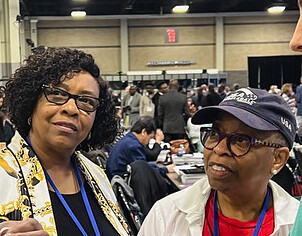BWC delegation leaders see new day dawning
By Erik Alsgaard*
 CHARLOTTE – (April 28) -- As the first week of General Conference wrapped up its first week of work on Saturday, April 27, the Baltimore-Washington Conference delegation co-chairs took a moment to reflect on their efforts and what lies ahead.
CHARLOTTE – (April 28) -- As the first week of General Conference wrapped up its first week of work on Saturday, April 27, the Baltimore-Washington Conference delegation co-chairs took a moment to reflect on their efforts and what lies ahead.
For both the Rev. Ianther Mills and Cynthia Taylor, the work has been good and they remain hopeful of things to come. You could even say that it feels like a whole new day for them and the church.
Mills, pastor at Asbury UMC in Washington, D.C., is attending her fourth General Conference.
“I’m really excited,” she said. “I feel like it’s a wonderful opportunity to be part of a General Conference that is about to do some things that are monumental and will be historical.”
Part of that excitement, she said, comes from some of the early passage of petitions to help move the church to regionalization. General Conference has already approved much of the legislation that aims to give different geographic regions in the church equal standing in decision-making. The enabling legislation passed 586 to 164 – 78 percent of the vote – but since it is a proposal to change the church’s constitution, it must be ratified by at least two-thirds total vote of all annual conference lay and clergy voters around the world. That voting would begin later this year and continue into 2025.
Regionalization has become shorthand here for a package of legislation that would restructure the denomination. Under the legislation, the U.S. and each central conference — church regions in Africa, Europe, and the Philippines — would become regional conferences with the same authority to adapt the Book of Discipline, the denomination’s policy book, for more missional effectiveness.
Another part of her excitement, Mills said, is revising the Social Principles. The Social Principles are not church law but contain official church teachings on a multitude of current issues faced by United Methodists.
And the third piece that is capturing her attention is removing harmful language on what the church says and how it treats its LGBTQ members and clergy.
“Those (changes) are foundational things that need to happen in order for us to move forward as a denomination as we come out of this period of disaffiliations and even the pandemic,” she said. “I’m hoping and praying” that the so-called “Three ‘R’s’ – regionalization, revising the Social Principles, and removing harmful language -- will pass,” Mills said.
“For me, it’s felt like a whole new day,” Mills said, “in terms of the spirit of cooperation among delegates. The tone here is very much a spirit of consensus and cooperation; I feel like everyone is working towards what’s best for all.”
Taylor, a lay member of Mt. Olive UMC in Randallstown, is attending her second regular session of General Conference; she was also a delegate at the 2019 Special Session.
She said that she’s sensing an “atmosphere of anticipation” for what’s coming in Week 2.
“It’s a positive anticipation,” she said, rather than dread. “It was especially uplifting to hear Bishop Eben Nhiwatiwa’s sermon Friday morning because it was so uplifting and positive. He was extolling all of what he’s experienced and received as being a part of The United Methodist Church.” Bishop Nhiwatiwa serves the Zimbabwe Episcopal Area.
One area where Taylor sees hope is an increased sensitivity that The United Methodist Church is truly an international church.
“People are becoming more culturally sensitive,” she said. “They’re realizing that people from different cultures have different structures and cultural context that, in the past, people kind of rushed through. Now they’re stopping to listen and try to understand.”
Taylor has also noticed more young people at this General Conference involved as delegates, or voting members.
“We had a lot of young people that I’ve encountered, and some of them are head of their delegations,” Taylor said. “That is very refreshing for me to see so many young faces being eager to participate and being involved.”
As the legislative committees finished their work April 27, both Mills and Taylor heard reports that legislation dealing with revising the Social Principles and removing harmful language from the Book of Disciple is moving forward. Every petition to General Conference – more than 1,000 in total – is assigned to one of 14 legislative committees. Taylor worked in the Discipleship committee, while Mills opted for the Judicial Administration committee.
In the Judicial Administration committee, Mills said they worked on some of the prohibitive language in the Book of Discipline that forbids clergy from performing same-gender weddings. The legislative committee voted to remove that wording and it will come to the full General Conference for a vote next week. There will also be a minority report, she said, so that another side of the issue will also be heard.
As all of General Conference observes a sabbath day on Sunday, April 28, both Taylor and Mills will take time to prepare for the remaining five days of the meeting.
“As Bishop Sharma Lewis preached (on Thursday),” Mills said, “it’s important to stay ‘on bended knee.’ Prayer really is what undergirds us and keeps us faithful and in touch with God.”
Taylor added that the United Methodists throughout the Baltimore-Washington Conference can continue – or join them – in prayer.
“We have a lot of folks here from the Baltimore-Washington Conference,” Mills said, “helping to support the delegation and the General Conference. It just shows the dedication of people to the church to making us the best that we can be.”
*Rev. Erik Alsgaard is pastor of Community UMC in Crofton, Md.
